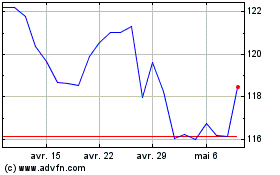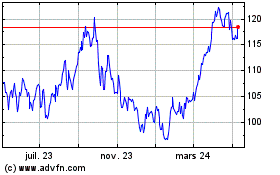Exxon to Create 'Low Carbon' Business Unit as It Faces Activists
02 Février 2021 - 12:13AM
Dow Jones News
By Christopher M. Matthews
Exxon Mobil Corp. is forming a business unit that will focus
exclusively on technologies to lower carbon emissions, as the oil
giant faces increasing pressure to step up its sustainability
investments.
Exxon said Monday that the new business, dubbed "low carbon
solutions," would invest $3 billion through 2025 on lower emission
energy technologies, primarily on carbon capture and storage
projects, which gather carbon emissions from industrial processes
or directly from the air and deposit them underground. Those
investments would represent roughly 3% to 4% of Exxon's planned
annual capital expenditures.
Exxon has a large research-and-development division that has
invested in carbon capture for years, and Exxon says it has
captured more carbon than any other company. Currently, the only
large-scale use for captured carbon is to help produce more fossil
fuels by pumping in the gas to squeeze more oil and gas out of the
ground.
"With our demonstrated leadership in carbon capture and
emissions reduction technologies, Exxon Mobil is committed to
meeting the demand for affordable energy while reducing emissions,"
Exxon Chief Executive Darren Woods said.
Exxon is expected to report a fourth consecutive quarterly loss
for the first time in modern history on Tuesday after previously
disclosing that it would write down as much as $20 billion in
assets. It endured one of its worst financial performances ever in
2020 and has already posted more than $2 billion in losses through
the first three quarters of 2020.
Following the outbreak of the new coronavirus last year, Exxon
discussed a merger with its top U.S. rival, Chevron Corp., The Wall
Street Journal reported Sunday. The talks were described as
preliminary and aren't currently ongoing.
The company's woes have helped draw the attention of activist
investors. One of them, Engine No. 1 LLC, has argued that the
company should focus more on investments in clean energy while
cutting costs elsewhere to preserve its dividend. The firm
nominated four directors to Exxon's board last week and called for
it to make strategic changes to its business plan.
As the Journal previously reported, Exxon also has been in talks
with another activist, D.E. Shaw Group, and has been planning to
announce one or more new board members, additional spending cuts
and investments in new technologies to help it reduce its carbon
emissions.
Rivals such as BP PLC and Royal Dutch Shell PLC have embarked on
bold strategies to remake their business as regulatory and investor
pressure to reduce carbon emissions mounts. Both have said they
would invest heavily in renewable energy -- a strategy that their
investors so far haven't rewarded.
Exxon hasn't invested substantially in renewables, instead
choosing to double down on oil and gas, arguing the world will need
vast amounts of fossil fuels for decades to come.
Some in the industry see carbon capture as a way to lower the
carbon footprint of fossil fuels, potentially allowing producers to
continue pumping oil and gas as some countries tighten regulations
on carbon emissions.
The only current, large-scale commercial use for captured carbon
is for a process called enhanced oil recovery, in which carbon is
pumped into older oil and gas reservoirs to increase pressure and
produce more fossil fuels. Exxon's largest carbon capture project,
in Wyoming, sells the gathered carbon to oil and gas companies.
Exxon said Monday that carbon capture projects could become more
commercially attractive with government support. It has supported
an existing tax credit in the U.S. for companies that capture and
store carbon.
Write to Christopher M. Matthews at
christopher.matthews@wsj.com
(END) Dow Jones Newswires
February 01, 2021 17:58 ET (22:58 GMT)
Copyright (c) 2021 Dow Jones & Company, Inc.
Exxon Mobil (NYSE:XOM)
Graphique Historique de l'Action
De Juin 2024 à Juil 2024

Exxon Mobil (NYSE:XOM)
Graphique Historique de l'Action
De Juil 2023 à Juil 2024
